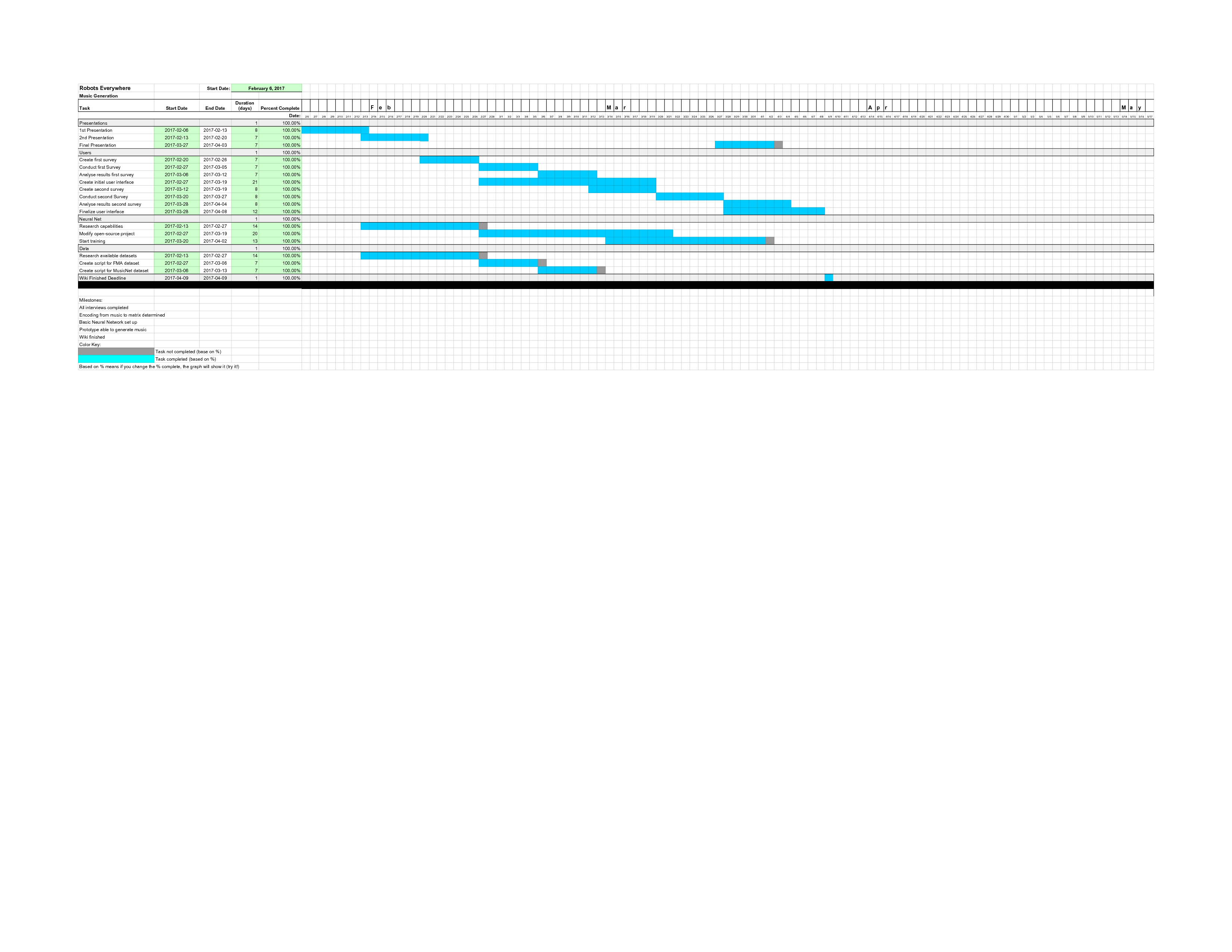PRE2016 3 Groep2
This is group 2's page
Group Composition
Group 2 has the following members:
- Steven Ge
- Rolf Morel
- Rick Coonen
- Noud de Kroon
- Bas van Geffen
- Jaimini Boender
- Herman Galioulline
Project Description
In this project, we will explore music generation using machine learning. Specifically we will consider how machine learning generating music can be used by consumers of music. Our hypothesis is that there are music consumers who have a particular taste for certain artists who are no longer alive (Bach for example). And these users are restricted to a fixed set of songs already composed by this artist with no variety - but desire new or more music of that same artist. A possible solution to this could be having a machine learning algorithm capable of generating songs containing the key characteristics that uniquely identify that artist. This would be done by training machine learning algorithm on that specific artist's songs. Our project will explore if there is indeed a large need/desire for this type of machine learning artist music emulation (or if not, then perhaps a genre generation or a mix of artists). Furthermore, we will also see if such a machine learning algorithm is in fact feasible to implement and provide convincing music.
Machine Learning
To implement out Machine Learning idea to be able to mimic a certain artist we plan to use a Machine Learning algorithm called WaveNet. WaveNet is a deep neural network that takes raw audio as input. Already, it has been used successfully to train on certain dialects to create a state-of-the-art text-to-speech converter. Specifically, WaveNet has been shown to be capable of capturing a large variety of key speaker characteristics with equal fidelity. So instead of feeding it voice data, we intend to feed it musical input in order to train the network to generate our desired music.
WaveNet is an open source project written in python and is available on GitHub. This easy access will not only allow us to modify WaveNet if we find it necessary but also ensure that there is a community available to help if needed.
Training Data
For training data we plan to use 3 main artists: Mozart, Bach and Beethoven. The reason for these choices is that firstly there is no worry about copy right issues on any of these artists music. But also that they have written hundreds of songs all of which are fairly long (compared to today's music). Thus, the high number of hours of music available from these artists will ensure that the machine learning algorithm is trained on a sufficient amount of data. Depending on how the project proceeds this may be subject to change.
Art Robots
How the art created by robots, will affect art and artists. Having the ability for robots to create art will push the frontier of what robots are capable of and break through into one of the last safe havens of man-only activities.
Planning (subject to change)
GANT chart

This GANT chart is created to keep this project organized. It shows in which activities this project consist, when these activities take part and when an activity needs to be finished.
It also contains a list of milestones. This list shows in which parts this project is divided. The major activities of the GANT chart (somewhat) correspond to these milestones.
During the course, the percentage of completeness in this GANT chart will be updated.
week 1
Deciding on the subject of the project Working on first presentation
week 2
First presentation done Working on second presentation Create a project plan (the GANT chart) Create a task division Start researching Data Engineering Start researching Tensor flow Start working on wiki
week 3
Second presentation done Start interviews
week 4
week 5
week 6
Interviews done
week 7
Start creating prototype
week 8
Researching done
week 9
week 10
I think the GANT chart is incorrect (Written here so I wont forget)
Division of Tasks
For the USE part of this project, we have given each member of the group a task. Each task involves interviewing people related to the creation of art/music with artificial intelligence and/or people related with the music industry.
- Steven Ge: Make use part go smoothly (and conduct extra interviews)
- Rolf Morel: Interview a deep learning professor
- Rick Coonen: Interview a musician (or any other person that creates music)
- Noud de Kroon: Survey the populus
- Bas van Geffen: Interview a professor at a conservatorium
- Jaimini Boender: Interview Tijn Borghuis
- Herman Galioulline: Interview a producer (A person that makes money from the music industry, but does not create music him-/herself)
For the technical part of this project, we have split the group into two teams. The Tensor flow team will work on the Neural network (which for which we use Tensor flow) and the Data Engineering team will gather test data and find a suitable encoding.
Team Tensor flow:
- Noud de Kroon
- Bas van Geffen
- Herman Galioulline
Team Data Engineering:
- Rick Coonen
- Jaimini Boender
- Rolf Morel
- Steven Ge